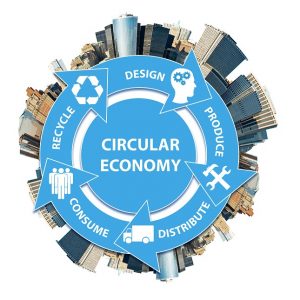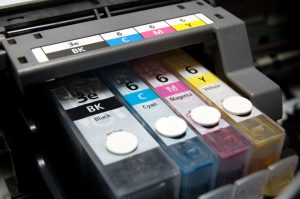An open letter to the European Commission, in response to the EU’s Circular Economy Report
July 31, 2020

When you buy a car, you are not told you can only fill it up at a certain petrol station – but when you buy a printer your hands are tied to the costly ink cartridge replacements sold by the manufacturer of the printer. This needs to change.
We are writing as the European Toner and Inkjet Remanufacturers Association (ETIRA), a non-profit organisation, representing the interests of the inkjet and toner cartridge remanufacturers.
In response to the welcome publication of the EU’s Circular Economy plan, we are calling for the EU to now take fast action against the way that printer manufacturers, who are for the most part based outside the EU, are holding consumers hostage to costly and environmental damaging replacements for their ink.
Our industry, a textbook example of Circular Economy, should be experiencing strong growth as we improve the European environment, provide savings for consumers, and create jobs. But the reality is that it is shrinking, and this is mainly due to the lack of a regulatory European framework facilitating cartridge reuse. The current EU approach, whereby printer manufacturers have only voluntary commitments to reduce the environmental impact of printing, (EU “Voluntary Agreement Imaging Equipment”, VAIE), has massively hindered cartridge reuse.
The current printing business model has a devastating impact on the environment, creating huge waste due to the short life of printing hardware combined with single-use cartridges mostly made from plastics. In addition to the single use cartridges from the printer manufacturers, there is an invasion of cheap non-OEM single use cartridges from Asia into Europe. Those cartridges may be a health and safety risk, because tests have shown that the chemicals and plastics used did not comply with minimum EU standards and are therefore not suitable for reuse or recycling.
According to the recent study commissioned by the EU (Task 1-7 assessment) on the deliverables of the last Voluntary Agreement:
- Cartridges create 2.5% of total small and medium electronic appliances’ waste
- Both the Small Office (SOHO) and home printer repair rate is zero
- The average operating time for home printer usage is only five hours during its expected four years’ life.
- The average total operational cartridge life is just 19 minutes
- Globally, the recovery thresholds for producers are far from being reached, and some OEM’s still incinerate 100 % (!) of what they recover
It is shocking to see that today you need 26 cartridges to print 10,000 pages vs. just one cartridge 20 years ago!
These increases in totally unnecessary plastic, metal, and other waste, in addition to the invasion of non-OEM single use plastic cartridges, must be stopped. Printer manufacturers should commit to implementing clear and measurable re-use objectives and targets. That is why we need an end to anti-cartridge reuse tactics such as chips and firmware updates that are blocking re-use cartridges, we need a minimum percentage reserved for reuse cartridges in the total number of cartridges placed on the EU market, and we need a full stop to the invasion of cheap and polluting single use non-OEM plastic cartridges from outside the EU.
ETIRA fears that it will be close to impossible for a Voluntary Agreement to achieve these objectives.
Especially in the current macro-economic situation, it is important to note that for printing, the remanufacturing industry does and will create jobs inside the EU: merely doubling the current rate of reuse would generate up to 16,000 – 20,000 additional jobs across the EU.
Now is the time for change. We need to see new legislation to reduce, promote preparation for re-use (e.g. remanufacturing) and raw material recycling – and thus create a circular economy in printing, in line with the Circular Economy Action Plan. The current original equipment manufacturer (OEM) printing business model is coercive to end users, wastes limited resources, and generates unnecessary waste. We want to see that changed.
Consumers should have freedom of choice, in line with the upcoming “right to repair and reuse” concept included in the EU’s Circular Economy Action Plan, instead of having their hands tied to one supplier. We know that the size of ink content and cartridges has decreased over time, while the price of printing is skyrocketing and that should not be allowed to continue.
We hear the stories of people buying a home printer, buying expensive ink cartridges and then finding that, when there is a problem with the printer, it is cheaper to just buy a new one that comes with new ink cartridges, rather than to repair the printer.
This has to stop. Our society cannot accept it. No other industry would accept this.

On behalf of all our members, businesses and consumers across Europe, we want to truly empower customer freedom of choice by facilitating true competition between OEM dealers and remanufacturers. Currently there is no freedom of choice and repair in the sector and no meaningful secondhand market.
Tags
cartridge reusecircular economy
EU Circular Economy plan
Inkjet cartridges
HP firmware update: ETIRA urges HP to change course and take ‘path of sustainability’
July 29, 2020

The European Toner and Inkjet Remanufacturers Association (ETIRA) is urging HP to rethink its latest printer firmware update.
The update, version 2025A/2021B – released in July 2020 – affects HP OfficeJet 5220, 5255, 5230, 5232, HP ENVY 5020, 5032 and HP DeskJet 2621 devices.
In the past, similar updates have blocked out reused HP cartridges across the globe, causing significant financial damage to end-users, resulting in many claims against HP. ETIRA is hoping to avoid a similar situation again.
Javier Martinez, president of ETIRA, said: “It is quite clear that HP printer owners using reuse cartridges who update the firmware, may find that their cartridges no longer work, and this is down to HP. Its printers use something called ‘dynamic security’, which recognises cartridges that aren’t HP branded and stops them from working and this is unacceptable for a variety of important reasons.
“Firstly, the result of the overnight change is that reuse/remanufactured HP cartridges no longer function in the printer in which they are installed, and they may render remanufactured stock cartridges useless. End-users can no longer print, and this is especially painful in the current COVID-19 environment, where many are forced to use home printers to do their job.

“Secondly, the resulting higher volume of non-working but full cartridges exponentially increases waste treatment risks, as treatment plants are designed to process empty cartridges, not full ones.
“And finally, but most important: this approach has an unnecessary and negative environmental impact as good products are wasted prematurely and unnecessarily. Reuse of a cartridge several times, followed by recycling its base materials is by far the preferred option as it reduces CO2 emissions by up to 45%-60%, and saves energy and natural resources.
“Our members will hold HP responsible and liable for all damages occurring from this update and under the new EU Circular Economy Action plan mandate and existing waste regulations, HP may find that its actions are considered an environmental offence.”
ETIRA has mentioned this issue to HP on numerous occasions but so far to no satisfactory conclusion. The association has now again written to the firm, raising its concerns.
Javier Martinez added: “HP’s printer cartridges business model is the opposite of sustainability, forcing end-users to buy a new cartridge each time instead of reusing it several times. It also renders reuse cartridges useless without cause and goes against the new EU policy to become carbon-neutral and promote reuse EU-wide.
“On behalf of our members and all those across Europe who use reusable cartridges, we urge HP to abandon this strategy of creating pollution and take the path of sustainability instead which will allow consumers and third parties to easily reuse HP cartridges without being hindered by unnecessary firmware updates that block out remanufactured HP cartridges.”